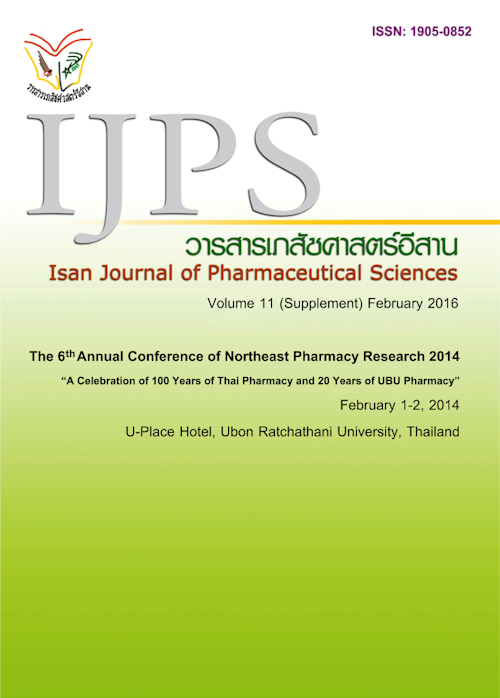Effect of Thai sour Fruits on the Expression of Hepatic Cytochrome P450 in Mouse Livers
Main Article Content
Abstract
Introduction: Hepatic cytochrome P450 enzyme (CYPs) is the superfamily of metabolizing enzyme response to xenobiotics or drug metabolism, leading to more polar metabolites and more excretion. Poly-medicine or receiving several drugs can inhibit or induce some isoform of CYPs and cause drug interactions. Beside drugs and xenibiotics, daily food or supplements might affect the expression of CYPs. In the present study, the effects of eight sour Thai fruits juice namely common lime, star fruit, Burmese grape, Southern langsart, salak, Thanathon orange, special honey orange, and pommel on the activities of hepatic CYPs were determined. Materials and Method: The effects of eight sour Thai fruits juice namely common lime, pommel, Thanathon orange, special honey orange, Southern langsart, Burmese grape, star fruit, and salakon CYPs enzyme activities were examined in vitro (in mouse hepaticmicrosomes), in which ethoxyresorufinO-deethylase (EROD), methoxyresorufinO-demethylase (MROD), benzyloxyresorufinO-dealkylase (BROD)/pentoxyresorufinO-dealkylase (BROD/PROD), and erythromycin N-demethylase (ENDM) activities are the specific markers for CYP1A1, CYP1A2, CYP2B9/CYP2B10, and CYP3A respectively. Results: The median inhibitory concentrations (IC50) of eight sour Thai fruits juice on CYPs activities were reported. All of eight sour Thai fruits juice inhibited the activities of CYP1A1, CYP1A2, CYP2B9/10, and CYP3A enzymes via inhibitions of EROD, MROD, BROD/PROD, and ENDM reactions, respectively. Moreover, Burmese grape possessed the highest potency on inhibition of several CYPs isoform. Conclusion: The observations suggested that consumptions of these eight sour Thai fruit juice, especially Burmese grape, might be concerned in the term of food-drug interaction, especially consumption for a long time and the large amount.
Article Details
In the case that some parts are used by others The author must Confirm that obtaining permission to use some of the original authors. And must attach evidence That the permission has been included


